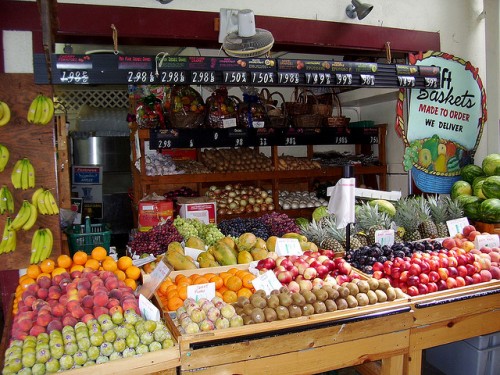Budgeting
50 Ways to Save Money on Food
 Food is one of the biggest line items in a budget, usually behind only rent or a mortgage — and maybe the utilities. It’s also a necessity so you can’t just give it up and eliminate the cost. Many people make an assumption that the only way that they can cut their food budget is to start eating things like Ramen noodles and Hamburger Helper every night. This couldn’t be further from the truth. There are a lot of different ways to reduce your food budget without reducing the quality of the food you purchase and the meals you make. Below is a list of fifty ways that you can save money on food which are worth considering:
Food is one of the biggest line items in a budget, usually behind only rent or a mortgage — and maybe the utilities. It’s also a necessity so you can’t just give it up and eliminate the cost. Many people make an assumption that the only way that they can cut their food budget is to start eating things like Ramen noodles and Hamburger Helper every night. This couldn’t be further from the truth. There are a lot of different ways to reduce your food budget without reducing the quality of the food you purchase and the meals you make. Below is a list of fifty ways that you can save money on food which are worth considering:
Coupons
Coupons are a great way to reduce your grocery bill. Check out Saving Advice’s coupon class for tips and ideas, visit Coupon Sherpa to print grocery coupons, or explore Grocery Coupon Guide for more in depth grocery coupon information.
Shop the Sales
Plan your meals around what is on sale in a given week. If you can do this, you will immediately cut your grocery bill by a significant amount. No, you may not always be able to have your favorites, but you will pay much less.
Match Sales to Coupons
For bigger savings, match your coupons to the items that are on sale in a given week. You don’t have to spend a lot of time doing this yourself. There are now coupon blogs that will do the matching for you (and tell you exactly where to find the coupons needed). Let them do all the work and enjoy the savings (to find a blog doing this, simply search “coupon matching” and the name of the grocery store you shop at)
Compare Sizes
Manufacturers have learned that shoppers assume that larger sizes mean better unit prices. This is not always the case. Sometimes the biggest size isn’t the best value, especially if you are using coupons. Check the unit prices listed on the shelf tags, or carry a calculator to figure it out for yourself.
Buy in Bulk (sometimes)
Buying in bulk can save money if you will use up all of the product before it goes bad and if the per unit price is better than buying smaller/individual products. You also have to have the restraint to use the bulk item at a reasonable pace instead of using a lot more because it happens to be there. Buying in bulk can be a great way to save money, but you have to be careful of the pitfalls.
Eat Less
Most of us eat way too much. Reducing food portions is one of the many things you can reduce to save money. Eating less is simple, but effective. And it’s good for the waistline.
Stop Wasting Food
Every bit of food you throw in the trash is like throwing money in the trash, and we throw away a good portion of the food that we buy. If you can figure out ways to reduce the amount of food you waste, this will in turn reduce the amount of food you need to buy. For ideas to cut waste, check out these two articles: The Easiest Way to Save on Food and Simple Ways to Reduce Food Waste
Plan Meals
Plan your meals ahead of time so you don’t get stuck with nothing to make or no ideas. Lack of planning leads to meals out or trips to the grocery store to buy food when it’s not on sale. The better that you can plan your meals, the more money you are likely to save on your food budget.
Use Loyalty Cards
If your store offers a loyalty card, sign up and use it. Loyalty cards often provide discounts on food and groceries which are only available if you have a loyalty card. The savings with these cards can be quite significant — often double digit percentage savings. Loyalty programs can also be an excellent way to teach kids about money.
Give up Fast Food
While fast food can sometimes appear to be inexpensive, the reality is that it’s more expensive than eating at home. There is no doubt that it’s definitely harder on your health. While it may not be quite as convenient to cook your own meals as get them at the dive-through window, it will help your food budget and your health.
Learn to Cook at Home
If you don’t know how, it isn’t hard to learn to cook, and it is well worth the time and effort learning for the savings that you will gain from it.
Get over Your Addiction to Eating Out
If you love eating out, think about the money you’re spending and whether or not it’s really worth it.
Buy Store Brands
The secret that seems to still not have gotten out is that store brands are often produced by the same manufacturers that produce some of the brand names, just with different packaging. Store brands are often cheaper (especially if you don’t use coupons) and it’s difficult to taste any difference in many cases.
Learn to Love Leftovers
Leftovers mean you get two meals for the price of one and you don’t have to cook as often. Here are two articles about the benefits of leftovers and how you can learn to like them: Think You Hate Leftovers? Think Again and Financially Secure People Eat Leftovers
Cook Ahead
If you know you’ll be pressed for time during the week, use some free weekend time to make a few meals which you can then freeze and easily reheat so you don’t hit the drive through on busy nights.
Explore Freegan-ism
It’s not for everyone and it’s not always legal, but some people get quite a bit of food by dumpster diving at restaurants and grocery stores. These places throw out unused and unexpired food on a daily basis which some people rescue from the dump and use for their own meals.
Make a Shopping List and Stick to It
One of the biggest costs when grocery shopping are impulse purchases. Studies have show that the more time the grocery store can get you to stay, the more you are likely to impulsively spend. Sticking to a shopping list eliminates impulse buys saving both money and time.
Shop Non-Traditional Stores
Bread outlets, farmers markets, butchers, ethnic stores, and ding and dent stores are all sources of less expensive food than traditional grocery stores. The same is true within the store. If you go to the ethnic section within your grocery store, you will often find the same spices for less money than they are selling in the spice section.
Buy In-Season Produce
In-season produce is cheaper than out of season produce that has to be imported. Learning to cook meals that utilize produce that is in season can greatly reduce the cost of your meals during that season.
Package Your Own Snacks
Don’t buy the individual sizes of crackers, cookies and chips unless you score a great deal. Instead, buy a big package and package it yourself in baggies or containers.
Save When You Do Eat Out
There will be times when you do eat out, but that doesn’t mean that you have to spend a lot. There are a number of ways to save money even when eating at restaurants. For the times when you must eat out, here are two articles offering ideas on how to save: 10 Ways to Save Money When Eating Out and Save Money By Asking for What You Want in a Restaurant
Use a Price Book
It’s difficult to know when a deal is really a deal if you don’t know what a good price on a particular product is. A price book allows you to easily track prices at several stores and to know when something is a great deal. Here are some tips for creating a price book.
Check Your Receipt
Don’t be fooled into thinking that the computer scanning system can’t make mistakes. The systems do and these mistakes can cost you money. Some stores will even give you the items for free if you catch a pricing error (check your store’s policy if they offer this service).
Bring Your Own Bags
Not only is it good for the environment, there are more and more grocery stores that offer a small discount for doing so.
Don’t Shop Hungry
There is a very specific reason that the bakery is at the entrance of most grocery stores. The smell of freshly baked goods helps to make the shoppers in the store hungry and studies show that hungry people purchase more than those that aren’t hungry when they shop. Eat before you shop to cut down on impulse buys.
Shop Alone
The best way to get in and out of the grocery store is to have a list and to be there alone. Don’t bring the kids or spouse, if possible. They’ll start wanting things and soon you’ll have bought more than you intended.
Pay with Cash
Learn to bring and pay cash when at the grocery store to cut down on impulse buys and the products that just “happen” to end up in your cart. With a credit card, you can pay for those extras. When you only have a set amount of cash on you, you have to stay within budget.
Know Your Store’s Policies
Knowing and understanding your grocery store’s policies can help save you quite a bit of money. Is a 10 for $10 only valid if you buy all ten, or is each item sold at a discount? What are the coupon policies? Does your store give rain checks? When you know what the policies are, you can use them in your favor to help reduce your food costs.
Brown Bag Your Lunch
This is an oldie but goodie which applies just as much today as it ever has. If you pack your own lunch instead of going out or buying from vending machines, you are going to save a lot of money throughout the year. if you never seem to have enough time to make your lunch in the morning, make it the night before.
Make Your Own Coffee
Learn to get your morning coffee fix at home rather than at the local Starbucks. If you can get yourself into the habit of making your own coffee, you can even invest in a really nice coffee maker and still come out ahead. In the same way, bring your own water and carry snacks with you when you leave home. Don’t buy from vending machines, convenience marts, or restaurants.
Start a Garden
If you have the space, growing your own food is one of the best ways to save money. As a bonus, you control the pesticide use and growing methods. Even if you have limited space, a herb garden can still cut down on your food costs.
Give up Bottled Water
The big secret about bottled water is most of it comes out of the the same system as the water that comes out of your faucet. If you happen to live in an area where the tap water isn’t good, purchase a filter to run it through. Then pour the filtered water in a reusable bottle to carry with you.
Give Up or Limit Soda
Soda is expensive, no matter how you cut it. It can cost $1000 a year. Since it’s not necessary, it’s one of those things you can give up if you need to save money.
Stockpile
If you have the space, stockpiling can be a great way to save by buying products when they are on sale. In fact, if you can learn to stockpile and plan your meals from what you have at home (and then buy only the best deals at the store each week to replenish the stockpile), you will have mastered the key to extreme couponing and can reduce your grocery bill by 50% or more even without using coupons.
Eat Less Meat
Have meatless meals a few times a week, or make meat a side dish rather than the main course. Meat is expensive and limiting its use can save you money. If you do like meat, consider making it a side dish rather the focal point of the meal so that you don’t need to purchase so much for every meal.
Shop the Perimeter of the Store
The perimeter of the store is where the basics are usually displayed including breads, fresh meats, dairy, and produce items. This is where you get the most nutritional bang for your buck.
Look for Clearance Items
Many grocery stores have ding and dent racks, day old bakery items, or a place for dairy items and produce that are about to expire usually at discounts of 50% or more (it’s better for them to get something for these items than nothing at all). If you can use them up before they go bad, these can represent great savings.
Change your Eating Habits
Your relationship with food has a lot more to do than just money. You have formed eating habits nad these habits are probably costing you more money than they should simply because they are habits. Changing the way you eat and your relationship to food can save you quite a bit of money.
Invest in an Extra Freezer
If you have the space, buying a chest freezer can be a great investment. Having extra freezer space enables you to build a stockpile of usually expensive food like meat when they are priced at their cheapest. It also gives you the space to conveniently freeze meals for future use.
Look into Community Sponsored Agriculture
You buy a “share” of the farmer’s crop before the growing season begins. What constitutes a share varies by farmer and crop; it could be a box of fruit or six watermelons. In return for your purchase, you receive your share each week throughout the growing season. Farmers use the advance payments to offset their expenses. This frees you up from having to do the work, but allows you to pick a farmer that will grow the food they way you want.
Participate in a Community Garden
Members of a community come together and use either public land, leased land, or the land of one or more members and grow a garden. In return for your labor and help in tending the garden and helping to buy seeds and supplies, you get to take home some of the harvest.
Buy a Crock Pot and Learn to Use It
Crock pots can turn out some very tasty, inexpensive meals. You can turn cheaper cuts of meat into stews, or you can throw a hodge-podge of ingredients in there and come out with a great meal. Crock pot cookbooks abound to help you out. The best thing is that you can put all the ingredients in the crock pot before you leave to work and the meal will be waiting for you when you get home.
Use Less Expensive Cuts of Meat
When you do buy meat, learn how to cook the less expensive cuts. These can still be delicious when the meat is made into stews, casseroles, and soups. The above mentioned crock pot can also do amazing things with meats.
Go for Caned or Frozen Instead of Fresh
Opt for canned or frozen fruits and vegetables, especially when these fruits and vegetables are out of season. They’re still healthy, but much cheaper than fresh. Also try canned or frozen meats like chicken, salmon, or tuna for things like casseroles or soups where the flavor and cut isn’t as important.
Practice a “Clean out the Pantry” Week
One of the main reasons that a lot of food gets thrown away is because you forget that you have it and it sits there until it goes bad or the expiration date goes by. The clean out the pantry week makes you go through all of the stuff that has been sitting in there. The concept is simple. You don’t buy anything new during this week, and use up the things you already have in your pantry and freezer. Get creative.
Consider Shopping Online
Some foods are less expensive to buy online. Non-perishables like chips, cereals, baking mixes, cookies, pasta, spices, canned foods, and dried beans can be found online sometimes for less than your local store. You also save the time and cost of going to the store. Some argue that having your groceries delivered is less expensive than going to the grocery store.
Price Match
More and more grocery stores are price matching their competitors. If you have a grocery store that will price match, you can go to a single store to get the best prices on all the food that week instead of wasting time and money going to a number of different grocery stores.
Shop When It’s Least Crowded
If you have the flexibility to shop when you want, choose times when the store will be least crowded to do your shopping. This is usually early in the morning and late in the evening. This will get you in and out of the store more quickly and lessen the likelihood of you making impulse purchases.
Be Wary of End Cap Specials
A special is not always a sale. Grocery stores have learned that customers assume that specials on the end of the aisles are good deals, but that is not always the case (and why it’s important to have a price book). If you can learn to ignore the advertising and look strictly at the price to determine if the product is a good deal, you can save a lot of money.
Look Up and Down
The products that the store earns the most money from will usually be at eye level while less expensive similar products will be on the upper or lower shelves. Stores know than many customers reach for the first product they see that fits their needs and thus place higher priced items where the customer is most likely to see it. By looking around a bit you can save quite a bit while still getting what you need.
There are a lot of ways to save on food. Some require a little creativity on your part or a new way of thinking about your shopping habits. Some, like gardening and coupon clipping, require some labor and time. But it’s worth it when you get that food budget down and you have more money for other important parts of your budget.
(Photo courtesy of lachshand)
Give the gift of savings! Learn more
Read the full article here

-

 Side Hustles6 days ago
Side Hustles6 days agoYou Might Not Get a New Job in 2025 Without These 2 Skill Sets
-

 Side Hustles5 days ago
Side Hustles5 days ago9 Questions Leaders Must Ask to End Employee Burnout
-

 Investing5 days ago
Investing5 days agoThe Marketing Mistake I Turned Into $1 Million in New Business
-

 Side Hustles4 days ago
Side Hustles4 days agoA Simple Four-Step Approach to Mastering Sales Psychology
-

 Side Hustles4 days ago
Side Hustles4 days agoHere Are the Cities Where Your Paycheck Goes the Farthest
-

 Investing6 days ago
Investing6 days agoSamsung and Google partner for augmented reality glasses By Investing.com
-

 Side Hustles6 days ago
Side Hustles6 days ago3 Business Models That Will Shape the Future of Entrepreneurship
-

 Make Money6 days ago
Make Money6 days agoTrump’s Plan to Collect Foreign Revenue: 6 Key Details to Know


















